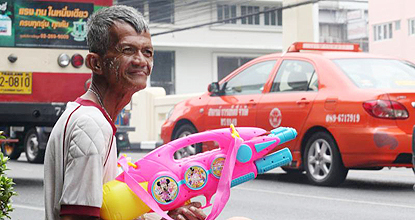
Many people are aware that April 13 is Songkran day while fewer recognise it is also National Ageing Day.

Prayong: Government should increase allowance
Similarly, many Thais know our country has reached ageing society status but do not regard it a serious matter.
Ladda Damrikarnlerd, manager of the Foundation of Thai Gerontology Research and Development Institute (TGRI), said many Thais know society has become an ageing one, but are not fully aware of its implications.
“We have to make Thais frightened of the results of becoming an ageing society in the near future,” she said.
The ageing society affects the working-age population.
In the good years, the support ratio or the number of adults aged 15-64 per one older person aged above 65 stood at 7:1, but it has now fallen to 5:1.
“In the next 10 years, it will reach 2.5:1, pointing to a rising burden among working adults in support of the aged and unavoidably affecting the country’s economy,” she said.
Defined by the United Nations, a society is considered to be ageing when 7% of the population are senior citizens aged above 65, or 10% are those aged over 60.
Mahidol University’s Institute for Population and Social Research says the Thai population stands at 64.8 million people, with 9.8 million people of them aged over 60.
Those who are over 60 make up around 15% of the population.
The country has become an ageing society over the past decade, the second fastest ageing population in Southeast Asia after Singapore.
It is estimated to continuously increase to 19.1% in 2020, 26.6% in 2030 and 32.1% in 2040.
The country will become a fully aged society when those over 60 comprise more than 20% of the population.
Birth rate decreases, improved medical care among the baby boomer generation — those born between the years 1946 to 1964 — were the main causes of the ageing population.
More income support for the elderly is needed, Dr Ladda said.
An old-age pension provides between 600 to 1,000 baht a month for the elderly. “That is obviously not enough,” said Dr Ladda.
Hopes of financial security for the elderly rose in 2011 when parliament approved the National Savings Fund Act.
Under the law, working people and the government contribute to the fund monthly. About 24 million people were likely to benefit from the law.
“It would be an efficient tool for the elderly who do not have access to any financial security,” she said.
The fund has yet to be established as the law has become entangled in bureaucratic red tape.
The Finance Ministry argues the national savings fund, if established, would overlap with the existing Social Security Fund Act which also has a clause to assist workers in the non-formal sector.
“Our culture gives importance to senior people, though it seems to be weakening every day.
''It does not mean that our gratitude is deteriorating, but the country’s economic situation forces people to work in the city and leave their ageing parents behind,” she said.
Prayong Sodsam-ang, 60, is one such elderly person who has stayed alone for eight years in an old house in Pathum Thani’s Thanyaburi district.
Luckier than many people of her age, she receives 1,900 baht from her children and 600-baht in old-age allowance each month.
“With only 2,500 baht, it is difficult to enjoy life as I have to pay for utilities, motorbike taxis to go to the hospital, food and so on.
''I avoid asking more from my children as they must take care of their own families.”
“The government should increase the old-age allowance to over 1,000 baht a month as 600 is insufficient for old people who cannot work,” she said.
She said she tried to sell food from a cart, but often fainted because she suffers from diabetes, hypertension and hyperlipidemia.
“If I feel lonely, I will watch TV and chat with my neighbours,” she added.